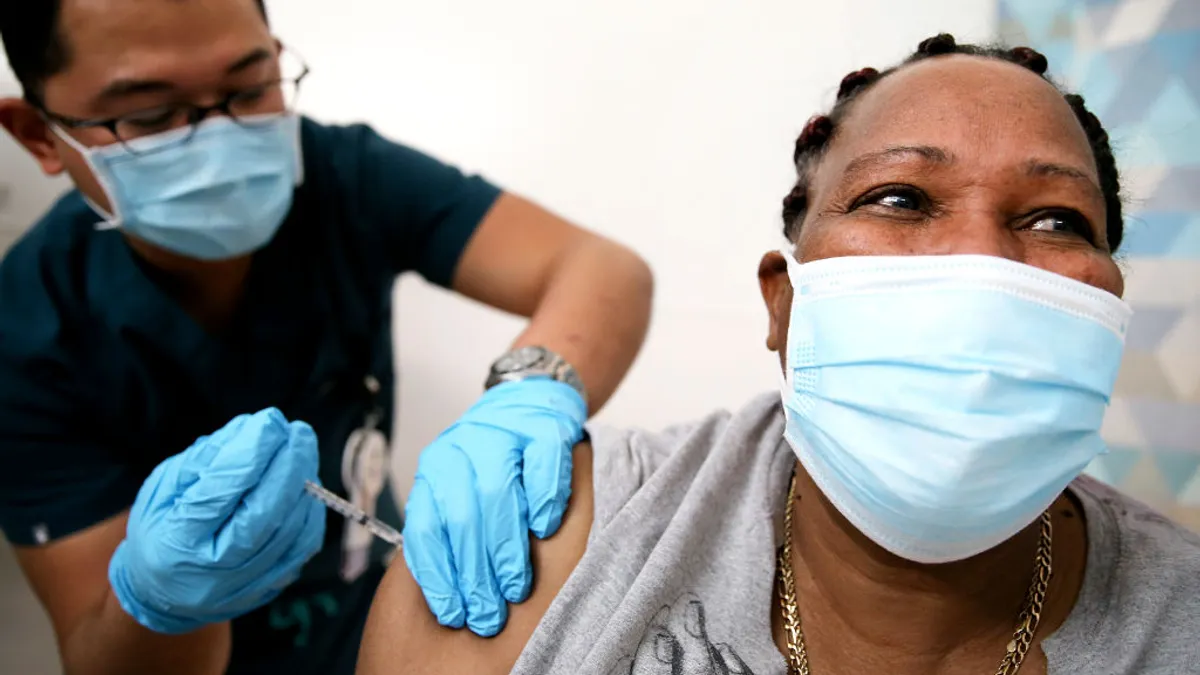Dive Brief:
- The Securities and Exchange Commission (SEC) further advanced a crackdown against companies that make fraudulent claims about COVID-19-related products by charging New York-based SCWorx and its former CEO for announcing bogus orders for coronavirus test kits.
- Soon after the onset of the pandemic, SCWorx and former CEO Marc Schessel claimed in an April 13, 2020, press release that a buyer had ordered 2 million COVID-19 rapid test kits as well as planned weekly orders for an additional 2 million kits for 23 weeks valued at $35 million per week, according to SEC allegations. Shares in SCWorx, which was financially troubled, soared 425% on a trading volume of 96.2 million, or more than 900 times the prior three-month average daily volume.
- “We allege that the defendants engaged in an age-old fraud — lying about their business prospects — to capitalize opportunistically on the COVID pandemic,” SEC Chair Gary Gensler said in a statement. “The SEC will continue to root out fraud and prosecute those who attempt to use the surge of uncertainty from the pandemic to defraud the investing public.”
Dive Insight:
Since the start of the pandemic in early 2020, the SEC has brought charges against several companies and top executives for exploiting the crisis by making false claims about coronavirus test kits, face masks and thermal scanners used to detect fevers. The agency has also ferreted out coronavirus-related stock manipulation and often targeted microcap companies.
Among at least eight cases, the SEC in April 2020 announced charges against Praxsyn and its CEO for allegedly making false claims that it could supply customers with large numbers of N95 and other masks.
In a press release the prior month, Praxsyn said it had created a “direct pipeline from manufacturers and suppliers to buyers” of the masks, and that it was accepting minimum orders for 100,000 masks, according to SEC allegations in an April 28, 2020, press release.
Yet the company “never had any masks in its possession, any orders for masks or a single contract with any manufacturer or supplier to obtain masks,” the SEC said.
The following month the SEC announced charges against Applied BioSciences and Turbo Global Partners, saying they allegedly made false claims about products used to combat the coronavirus.
Applied BioSciences offered to sell finger-prick COVID-19 test kits that it said could be used by anyone for quick, private results. Yet the tests could be administered only in consultation with medical staff. Also, before the company’s announcement, the federal government had not authorized the tests, according to SEC allegations.
Turbo Global in a March 30, 2020, press release referred to a “multinational, public-private partnership” to sell thermal scanning equipment to detect individuals with fevers and help break “the chain of virus transmission through early identification of elevated fever,” the SEC said, citing the press release.
Yet Turbo Global had no agreement to sell the product and there was no partnership involving government entities, according to SEC allegations.
In September 2020, the agency charged Mark Schena, the president of Arrayit, for falsely claiming that Arrayit had developed a COVID-19 blood test when it had not yet bought materials to make a test. Schena said the test had been submitted for emergency approval and that there was high demand for it, the SEC alleged.
In the case announced Tuesday, the SEC alleged that SCWorx and Schessel, its CEO, promoted the availability of test kits “despite having neither a legitimate supplier of COVID-19 test kits nor an executed purchase agreement with a buyer.”
“Schessel and SCWorx repeatedly made false representations to the investing public about the distribution of COVID-19 rapid test kits at a time when the need for truthful disclosures was especially critical,” Gurbir Grewal, director of the SEC’s Enforcement Division, said in a statement.
SCWorx agreed to a settlement that includes the payment of a $125,000 penalty and disgorgement of $471,000 with prejudgment interest exceeding $32,000, the SEC said. The company did not deny or admit to the allegations.












